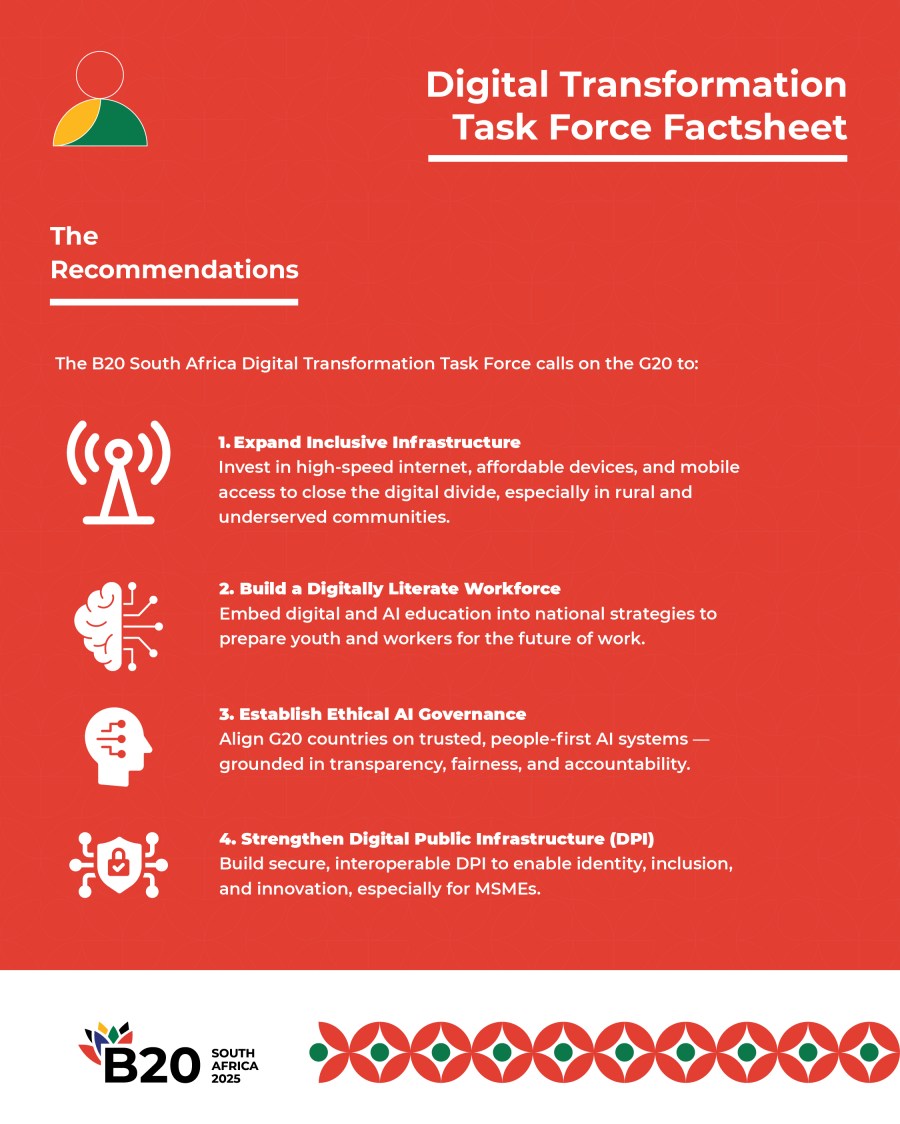From 18 to 20th of November, Johannesburg hosted B20 South Africa, the business forum accompanying South Africa’s G20 presidency. Business leaders, institutional representatives and experts in international cooperation gathered to analyse the economic challenges of a world in the midst of transformation.
The South African presidency has given special relevance to this edition, not only because it is the first African country to lead the G20, but also because of an international context marked by geopolitical challenges, economic uncertainty and structural gaps that require renewed responses from the private sector.
In this context, B20 South Africa has set out to redefine the global conversation on development, investment, innovation and cooperation, emphasising the need to strengthen links between advanced and emerging economies. Its central message is clear: no global strategy will be sustainable if large sectors of the world are left out of financing, digital innovation and new value chains.
The strategic priorities of B20 South Africa for inclusive prosperity
Under this premise, B20 South Africa has brought together leading companies and international organisations to develop policy recommendations aimed at strengthening global cooperation and moving towards more equitable prosperity.
These proposals, the result of months of analysis and collaborative work by eight international working groups, reflect the diversity of perspectives within the global business community and its commitment to a more inclusive, resilient economy based on enhanced cooperation.
The recommendations focus on the priority areas defined by the B20 South Africa: Trade and Investment, with an emphasis on restoring stability in multilateral trade and supporting greater trade integration in developing economies; Employment and Education, to promote the digital and technical training needed in the global economy; Digital Transformation, to promote inclusive digitalisation that reduces gaps and generates new economic opportunities; Energy Mix and Just Transition, aimed at expanding climate finance and supporting accessible and sustainable energy models; Finance and Infrastructure, to mobilise private capital towards impactful development projects; Industrial Transformation and Innovation, to strengthen the competitiveness and resilience of industries and SMEs and promote the adoption of sustainable technologies; Integrity and Compliance, highlighting the importance of technology in combating corruption and strengthening trust in global markets; Sustainable Food Systems and Agriculture, essential for food security and climate resilience.
All recommendations are consolidated in the Final Communiqué, which will be delivered to the G20 as a roadmap to guide future actions and commitments.
The challenge of global digital transformation in figures
Digital transformation remains one of the greatest global challenges. According to B20 South Africa, 2.6 billion people worldwide still do not have access to the internet, representing enormous untapped human potential. Many of them live in emerging economies or rural areas, where digital infrastructure is limited.
Furthermore, affordability remains a key obstacle: globally, the average cost of a smartphone represents about 26% of a person’s monthly income, rising to 53% in low-income countries. Added to these barriers are the gender gap and inequalities between urban and rural areas, limiting participation in the digital economy.
Likewise, according to the B20, small and medium-sized enterprises require support to integrate digital technologies, as their adoption is currently lower than that of large companies. For example, only 20-30% use cloud services, compared to 50% in larger companies.
The B20 stresses that closing these gaps is crucial to ensuring more balanced and inclusive economic and social development. For example, according to the World Bank, a 10% increase in broadband penetration in emerging and developing countries could raise their GDP by 1.35%. However, realising this potential requires closing the wide global gap in digital infrastructure investment, estimated at $1.6 trillion, with the greatest needs in developing regions.
At the same time, the adoption of generative artificial intelligence could generate up to $4.4 trillion annually globally, if managed inclusively.
Recommendations for inclusive digital transformation
The B20 warns that without robust policies and governance frameworks, the benefits of digitalisation could be concentrated in a few countries or companies, increasing inequalities. The forum’s proposal aims to make digital transformation a driver of equity, inclusion and growth, ensuring that no region or group is left behind in the technological revolution and future prosperity.
In this context, the B20 proposes four priorities to the G20 to address this challenge, which require close collaboration between governments and the private sector:
- Expand modern and inclusive digital infrastructure and connectivity to provide affordable and reliable access to digital services, especially in underserved regions.
- Strengthen national digital literacy systems to provide the workforce with basic and advanced skills aligned with the demands of the future-oriented labour market.
- Promote secure, reliable, inclusive and people-centred AI, based on ethical standards, regulatory clarity and transparent practices.
- Promote secure and inclusive digital public infrastructure (DPI) ecosystems that encourage private sector innovation and investment.
The ultimate goal is to make digital transformation a driver of equity and trust, where connectivity and emerging technologies not only drive innovation but also reinforce social and economic inclusion.








